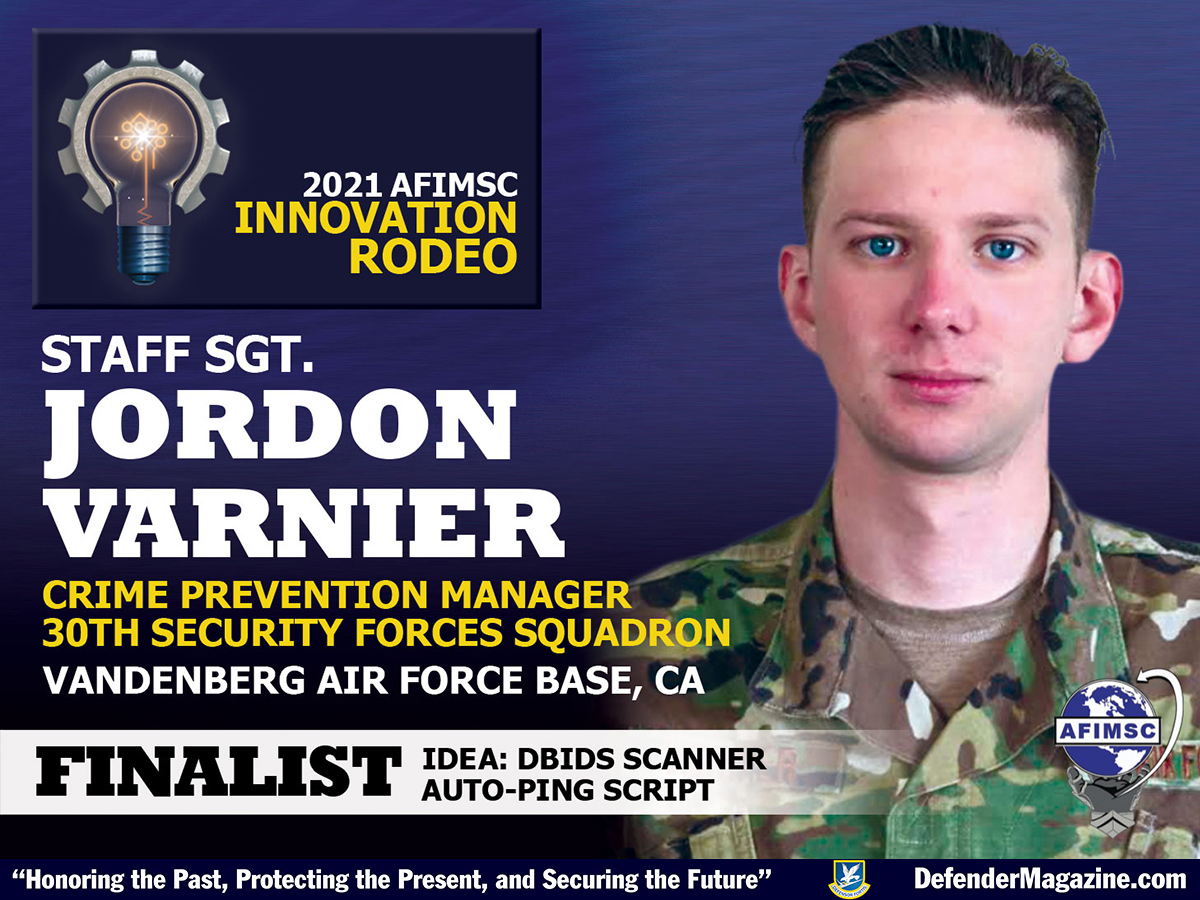JOINT BASE SAN ANTONIO-LACKLAND, Texas – Staff Sgt. Jordon Varnier, crime prevention program manager for the 30th Security Forces Squadron at Vandenberg Air Force Base, California, believes innovation is the key to developing a more efficient and reliable warfighting force.
“Former Australian Prime Minister Julia Gillard once said, ‘Our future growth relies on competitiveness and innovation. …’ I believe this applies greatly to this topic,” said Varnier, who was born in Brisbane, Australia, but grew up in Austin, Texas. “We have to embrace and encourage innovation if we wish to continue to excel as the world’s leading air power.”
Varnier will have a chance to help develop a more innovative Air Force as he was selected to be one of eight finalists for the 2021 Air Force Installation and Mission Support Center’s Innovation Rodeo. We recently asked Varnier about his idea.
Q: What are your primary duty responsibilities?
A: My primary responsibilities lie in managing the Defense Biometric Identification System (DBIDS), California Law Enforcement Telecommunications System (CLETS), and an explosive detection program. I spend the majority of my day troubleshooting offline/broken DBIDS handheld scanners, reviewing scan data, updating trackers and creating CLETS accounts.
Q: What’s your idea for the 2021 AFIMSC Innovation Rodeo?
A: My idea is the DBIDS Scanner Auto-Ping Script. This executable script for Microsoft PowerShell sends a ping – test packets of data – to any number of devices to determine whether they are online or offline. This allows a base security officer (BSO) to immediately gauge if there are any offline handhelds, and proceed to go out to troubleshoot those particular handhelds. This prevents the BSO having to visit every entry control point to determine whether handhelds are online or not, saving man-hours.
Q: What problem will your idea solve?
A: The problem I have encountered with DBIDS handheld scanners is connectivity. They can lose their connection to the web access point, resulting in the handheld going offline. The troubleshooting process for getting it back online can take anywhere from five minutes to more than 30 minutes. At a large base like Vandenberg, it was taking a lot of time during the duty day to go around to every gate to ensure all handhelds were online and functional.
Q: How will your idea help the Air Force deliver installation and mission support capabilities, improve installations or support families in a better way?
A: This idea will improve mission support capabilities by increasing handheld uptime and BSO operation efficiency. It also affords BSOs more time to complete other tasks, improving their effectiveness.
Q: How did you come up with your idea?
A: This idea is based off of a college course I was taking, input from the member who previously held my position and some forum research I did on the topic. My predecessor told me the handheld scanners could be pinged as long as the Internet Protocol address was known, just like most other wireless devices. I combined this with the knowledge I gained from my information technology course and did some research on IT forums. Originally, I was pinging each device individually, but I decided to try to increase the efficiency of the process by creating a script that could pull IP addresses from a file and run all of them back to back. Once I was able to do that, I wanted to further the idea by also automating the process.
Q: Why do you think it’s important for the Air Force to consider innovative solutions and ideas for the base of the future?
A: Because innovation is what drives improvement.
Q: How does it feel to be selected as a finalist for the 2021 Innovation Rodeo?
A: Nerve-wracking and exciting. I am really excited to be able to share my idea on such a big stage, but I am also nervous since I have not presented for such a large-scale occasion before, if that makes sense.
Q: What are you hoping to gain from the experience?
A: Just that, experience. I want to enjoy the experience of being able to develop my idea further and present that idea to a panel of experts and representatives. I most look forward to sharing my idea with others who can improve and expand upon it, and hopefully learning even more about my idea and developing it further.
Q: Is there anything else you’d like to add?
A: There were some amazing ideas this year, so I would not be upset in the slightest if my idea is not number one. I am just happy to have made it as far as I have. I look forward to the next few weeks of further developing my idea. Thank you for this opportunity and I wish the other contestants the best of luck!
By Steve Warns, AFIMSC Public Affairs / Published January 21, 2021
